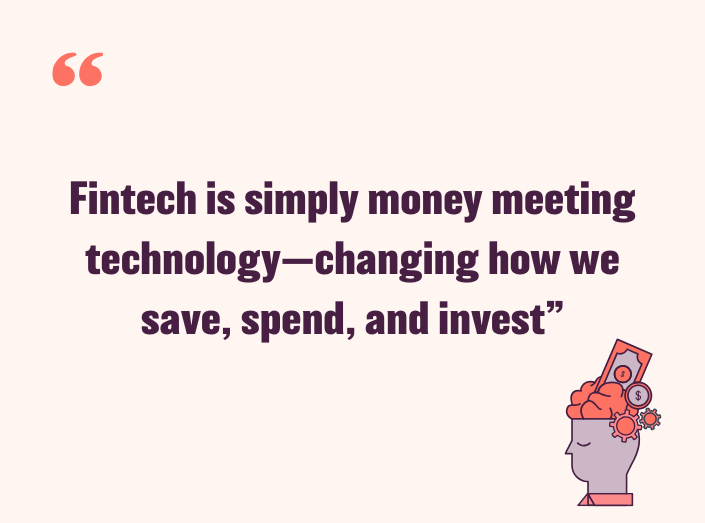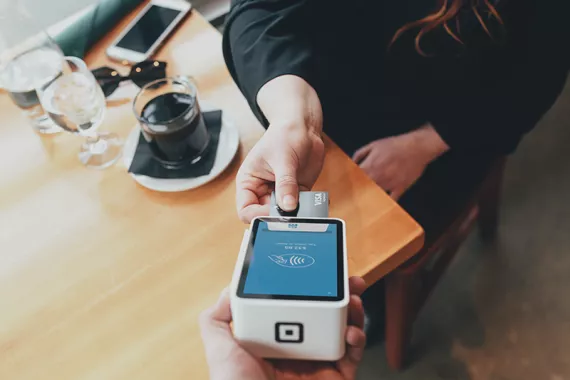Fintech is changing how we think about money
In the past, most people relied on banks for everything from savings to payments. Today, technology is reshaping finance in ways our grandparents could not have imagined. From paying for coffee with your phone to investing through an app, financial technology, or fintech, is everywhere.
But what exactly is fintech, and why is it such a big deal? Let’s break it down.

What is fintech?
Fintech is short for financial technology. It describes the use of technology to improve and simplify financial services. This includes things like digital banking, online payments, robo-advisers, and investment apps.
In simple terms, fintech is about making money management faster, cheaper, and more accessible. Instead of waiting in a bank queue, you can transfer money in seconds. Instead of needing thousands to start investing, you can begin with just a few pounds through an app.
Everyday examples of fintech
If you have used contactless payments, transferred money with Revolut, managed your savings on Monzo, or invested through Nutmeg, you have already experienced fintech in action.
Other examples include:
- Mobile banking apps that give you real-time access to your accounts
- Peer-to-peer lending platforms that connect borrowers directly with investors
- Crowdfunding sites that make it easier to support new businesses
- Cryptocurrencies like Bitcoin and Ethereum
- Tools that help businesses process payments online quickly and securely

Why fintech matters for the future of money
Fintech is not just about convenience. It is also reshaping financial systems in bigger ways.
First, it increases access. People who might not have had easy access to banking services in the past can now manage money from their phone.
Second, it drives competition. Traditional banks are being pushed to modernise, offer better customer service, and reduce fees.
Third, it opens up new opportunities for consumers. From investment apps that use artificial intelligence to budgeting tools that analyse your spending, fintech helps people make smarter financial choices.
Opportunities and risks of fintech
Like any innovation, fintech comes with both opportunities and challenges.
Opportunities include greater financial inclusion, faster services, and more choice. For consumers, it means easier saving, investing, and borrowing. For businesses, it can reduce costs and open up new markets.
Risks include security concerns, data privacy, and the possibility of relying too heavily on technology. Regulation is still catching up, and it is important for users to stay informed about how their data and money are protected.
The future of fintech
Fintech will continue to grow as technology advances. We can expect more use of artificial intelligence, blockchain, and automation in the years ahead. From personalised investment advice to global payment systems, fintech is already shaping the way money moves across the world.
For consumers, this means even more tools to take control of personal finances. For businesses, it means new ways to connect with customers and manage operations.

Final thoughts
Fintech is more than just a buzzword. It is one of the most significant changes in modern finance. By combining technology and money, it is reshaping how we save, spend, and invest.
For beginners, the best way to understand fintech is to start using it. Explore apps, try digital payments, or look into online investment platforms. The future of money is already here—and it is increasingly digital.
Want to learn more about fintech and the future of money?
Our courses are designed to help you understand financial technology in simple, practical terms. From digital banking to investing with apps, we cover the tools you need to feel confident in the modern financial world.
👉 Explore our upcoming courses
Because financial empowerment starts with understanding how money is changing.
Discover more
-
Saving vs. investing
-
Why you don't need to be afraid of investing.
Our 15 minute webinar is aimed at encouraging more women to take the plunge – but really, the facts apply to anyone who might be t... -
Advice vs. guidance
If you’re new to the world of investments, you could well be worried about how much it costs to get started. The short answer is: ...

